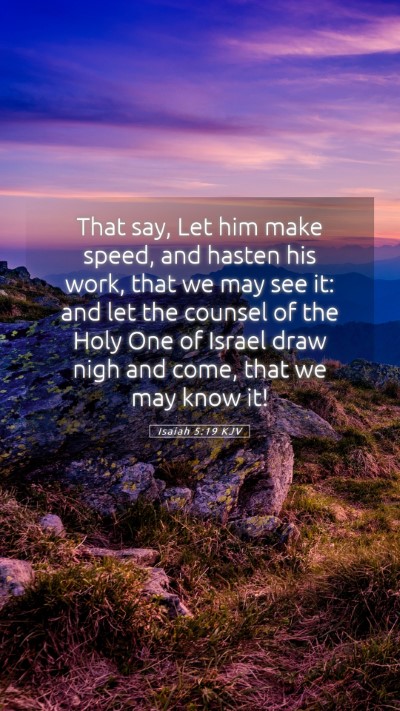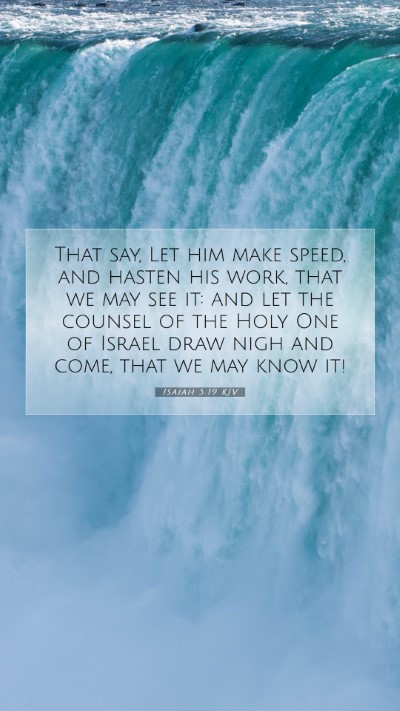Understanding Isaiah 5:19
Isaiah 5:19 reads: "Let him make speed, and hasten his work, that we may see it: and let the counsel of the Holy One of Israel draw nigh and come, that we may know it!" This verse encapsulates the cry of a people anxious for God's promises and intervention. In this commentary, we will explore the meaning of this verse by combining insights from various public domain commentaries, including those by Matthew Henry, Albert Barnes, and Adam Clarke.
Bible Verse Context
The context of Isaiah 5 is crucial for understanding its verses. Here, Isaiah addresses the people of Israel, expressing God’s displeasure with their behavior and the impending judgment. This verse highlights a desperation for God’s presence and a longing for divine action amidst a society filled with injustice and moral decay.
Key Themes
- Desperation for Divine Intervention: The people are urging God to act swiftly. This reveals not only their longing for God's presence but also a recognition of their need for His guidance and correction.
- Awareness of God’s Counsel: The request for God’s counsel to draw near indicates a belief in the wisdom and truth that comes from the Holy One of Israel.
- Expectations of God's Promises: The verse reflects an underlying faith that God will indeed fulfill His promises, emphasizing a deep-rooted hope in God's saving power.
Bible Verse Interpretations
According to Matthew Henry, this passage serves as a poignant reminder of the urgency with which we must seek God. He notes that the people are not merely seeking a demonstration of power but are longing for a manifestation of God’s wisdom and will in their lives. This desperation is often mirrored in human experience, where individuals seek answers in times of crisis.
Albert Barnes elaborates on the implications of the people’s plea, suggesting that it reflects a sense of impending judgment. He articulates that their call to God to hasten His work shows their acknowledgment of the gravity of their situation. Barnes emphasizes that this verse illustrates humanity's tendency to look towards divine intervention in times of turmoil, a behavior that resonates with many in modern contexts.
Adam Clarke provides further insight, noting that the phrase "let him make speed" indicates a craving for immediate action from God. Clarke suggests that this desperate call may also depict a broader human impatience regarding God's timing, correlating to the dilemmas faced in understanding God’s sovereign plans in our lives.
Application of Isaiah 5:19
This verse serves as a crucial reminder for believers today about the nature of their relationship with God. It encourages a posture of expectation toward God's workings in our lives, particularly when facing challenges or moral dilemmas. Here are some practical applications:
- Seeking God's Guidance: In personal and communal decision-making, seeking God’s counsel through prayer and Scripture can yield wisdom and direction in life's complexities.
- Patience with God's Timing: This verse invites individuals to learn patience while waiting for God's intervention, emphasizing trust in His perfect timing.
- Engaging in Community Prayer: Just as the people of Israel collectively cry out for God’s intervention, believers are encouraged to engage in corporate prayers, recognizing that spiritual battles are often best fought in unity.
Bible Cross References
- Psalm 27:14: "Wait for the LORD; be strong, and let your heart take courage; wait for the LORD!"
- Isaiah 40:31: "But those who wait for the LORD shall renew their strength; they shall mount up with wings like eagles; they shall run and not be weary; they shall walk and not faint."
- Isaiah 30:18: "Therefore the LORD waits to be gracious to you, and therefore he exalts himself to show mercy to you..."
Conclusion
In summary, Isaiah 5:19 reveals profound truths about human nature and divine interaction. It encapsulates a deep desire for God's presence and guidance within tumultuous circumstances. Through the insights provided by various commentators, believers gain a clearer understanding of this verse and its implications for their lives. As they study this verse and others, it’s vital to explore the historical context, engage with its theological significance, and apply its teachings to daily life.


